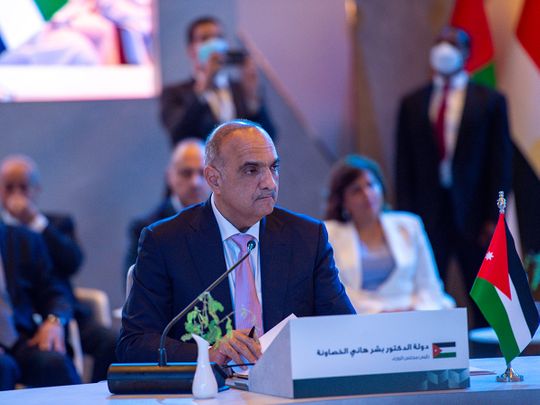
Jordan has unveiled a major development strategy for the Middle Eastern country up to the next 10 years targeting doubling its growth to help it rejuvenate an economy hit by regional turmoil.
The plan was a major plank of reforms pushed by King Abdullah since last year to help the oil importing country reverse a decade of sluggish growth hovering at around 2 per cent that was worsened by the pandemic and conflict in neighbouring Iraq and Syria.
The vision aims at attracting $41 billion in funds that will help raise the country’s GDP to 58.1 billion dinars ($82 billion) by 2033 from a current 30.2 billion dinars.
Prime Minister Bisher Al Khasawneh said he was committed to implementing essential free market reforms that businessmen say previous conservative administrations have long frustrated.
“We don’t have the luxury not to empower the private sector or the luxury of putting hurdles in the face of investors,” Khasawneh told a gathering of hundreds of businessmen, civil servants, and politicians who were invited by the palace to brainstorm and lay out the plan.
The traditional conservative establishment had long been blamed for obstructing a modernisation drive pushed by the Western-leaning ruler, fearing liberal reforms will erode their grip on power.
Khaswaneh said the government would also soon unveil a reform plan for a bloated public sector that expanded rapidly as successive governments sought to appease citizens with state jobs to maintain stability.
The runaway spending contributed to soaring public debt of $40 billion, equivalent to 90 per cent of gross domestic product, which Jordan has been struggling to rein in.
Jordan has, however, in the last two years won praise for a strong performance under a four-year IMF backed programme of structural reforms that brought fiscal prudence while avoiding austerity moves that triggered social unrest in past years.
The document said a key challenge was to absorb over a million youths in the next 10 years and reverse record unemployment that hit 24 per cent in a country where over a third of its 10 million population are under the age of 14.
“After 10 years if we don’t find solutions, we will have a million Jordanians without jobs,” Khaswaneh said.








